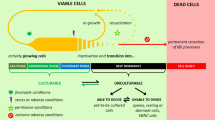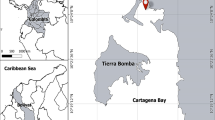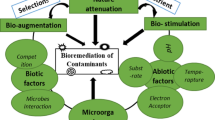Abstract
In this study, through a multistep enrichment and isolation procedure, a halophilic bacterial strain was isolated from unpolluted saline soil, which was able to effectively and preferentially degrade long chain alkanes (especially tetracosane and octacosane). The strain was identified by 16S rRNA gene sequence as an Alcanivorax sp. The growth of strain Est-02 was optimized at the presence of tetracosane in different NaCl concentrations, temperatures, and pH. The consumption of different heavy alkanes was also investigated. Optimal culture conditions of the strain were determined to be as follows: 10% NaCl, temperature 25–35 °C and pH 7. Alcanivorax sp. strain Est-02 was able to use a wide range of aliphatic substrates ranging from C14 to C28 with clear tendency to utilize heavy chain hydrocarbons of C24 and C28. During growth on a mixture of alkanes (C14–C28), the strain consumed 60% and 65% of tetracosane and octacosane, respectively, while only about 40% of the lower chain alkanes were degraded. This unique ability of the strain Est-02 in efficient and selective biodegradation of long chain hydrocarbons could be further exploited for remediation of wax and heavy oil contaminated soils or upgrading of heavy crude oils. Comparison of the sequence of alkane hydroxylase gene (alkB) of strain Est-02 with previously reported sequences for Alcanivorax spp. and other hydrocarbon degraders, showed a remarkable phylogenetic distance between the sequence alkB of Est-02 and other alkane-degrading bacteria.





Similar content being viewed by others
Notes
M = A or C.
Y = C or T.
S = C or G.
N = A, C, G or T.
R = A or G.
References
Altschul SF, Gish W, Miller W, Myers EW, Lipman DJ (1990) Basic local alignment search tool. J Mol Biol 215:403–410. https://doi.org/10.1016/S0022-2836(05)80360-2
Bradford MM (1976) A rapid and sensitive method for the quantitation of microgram quantities of protein utilizing the principle of protein-dye binding. Anal Biochem 72:248–254. https://doi.org/10.1016/0003-2697(76)90527-3
Cheng L, Shi S, Li Q, Chen J, Zhang H, Lu Y (2014) Progressive degradation of crude oil n-alkanes coupled to methane production under mesophilic and thermophilic conditions. PLoS One 9:e113253. https://doi.org/10.1371/journal.pone.0113253
Cole GM (1994) Assessment and remediation of petroleum contaminated sites. CRC Press, Boca Raton
Dastgheib SMM, Amoozegar MA, Khajeh K, Ventosa A (2011) A halotolerant Alcanivorax sp. strain with potential application in saline soil remediation. Appl Microbiol Biotechnol 90:305–312. https://doi.org/10.1007/s00253-010-3049-6
El Mahdi AM, Aziz HA, Amr SSA, El-Gendy NS, Nassar HN (2016) Isolation and characterization of Pseudomonas sp. NAF1 and its application in biodegradation of crude oil. Environ Earth Sci 75:380–391.‏
Elumalai P, Parthipan P, Karthikeyan OP, Rajasekar A (2017) Enzyme-mediated biodegradation of long-chain n-alkanes (C 32 and C 40) by thermophilic bacteria. 3 Biotech 7:116. https://doi.org/10.1007/s13205-017-0773-y
Golyshin PN, Harayama S, Timmis KN, Yakimov MM (2007) Family II. Alcanivoraceae fam. nov. Bergey’s manual of systematic bacteriology: volume 2: the proteobacteria, part B: the Gammaproteobacteria, vol 2. Springer, New York
Harayama S, Kasai Y, Hara A (2004) Microbial communities in oil-contaminated seawater. Curr Opin Biotechnol 15:205–214. https://doi.org/10.1016/j.copbio.2004.04.002
King RB, Long GM, Sheldon JK (1992) Practical environmental bioremediation: the field guid. CRC Press, Boca Raton
Kwon KK, Oh JH, Yang SH, Seo HS, Lee JH (2015) Alcanivorax gelatiniphagus sp. nov., a marine bacterium isolated from tidal flat sediments enriched with crude oil. Int J Syst Evol Microbiol 65:2204–2208. https://doi.org/10.1099/ijs.0.000244
Leahy JG, Colwell RR (1990) Microbial degradation of hydrocarbons in the environment. Microbiol Rev 54:305–315
Liu YC, Li LZ, Wu Y, Tian W, Zhang LP, Xu L, Shen QR, Shen B (2010) Isolation of an alkane-degrading Alcanivorax sp. strain 2B5 and cloning of the alkB gene. Bioresour Technol 101:310–316. https://doi.org/10.1016/j.biortech.2009.08.028
Margesin R, Labbé D, Schinner F, Greer CW, Whyte LG (2003) Characterization of hydrocarbon-degrading microbial populations in contaminated and pristine alpine soils. Appl Environ Microbiol 69:3085–3092. https://doi.org/10.1128/AEM.69.6.3085-3092.2003
Marmur J (1961) A procedure for the isolation of deoxyribonucleic acid from microorganisms. J Mol Biol 3:208–218. https://doi.org/10.1016/S0022-2836(61)80047-8
Martins LF, Peixoto RS (2012) Biodegradation of petroleum hydrocarbons in hypersaline environments. Braz J Microbiol 43:865–872. https://doi.org/10.1590/S1517-83822012000300003
McGenity TJ (2010) Halophilic hydrocarbon degraders. In: Timmis KN (ed) Handbook of hydrocarbon and lipid microbiology. Springer, Berlin, pp 1939–1951
Minerdi D, Zgrablic I, Sadeghi SJ, Gilardi G (2012) Identification of a novel Baeyer-Villiger monooxygenase from Acinetobacter radioresistens: Close relationship to the Mycobacterium tuberculosis prodrug activator EtaA. Microb Biotechnol 5:700–716. https://doi.org/10.1111/j.1751-7915.2012.00356.x
Mohanty G, Mukherji S (2008) Biodegradation rate of diesel range n-alkanes by bacterial cultures Exiguobacterium aurantiacum and Burkholderia cepacia. Int Biodeterior Biodegrad 61:240–250
Nicholson CA, Fathepure BZ (2004) Biodegradation of benzene by halophilic and halotolerant bacteria under aerobic conditions. Appl Environ Microbiol 70:1222–1225. https://doi.org/10.1128/AEM.70.2.1222-1225.2004
Paisse S, Duran R, Coulon F, Goñi-Urriza M (2011) Are alkane hydroxylase genes (alkB) relevant to assess petroleum bioremediation processes in chronically polluted coastal sediments? Appl Microbiol Biotechnol 92:835–844. https://doi.org/10.1007/s00253-011-3381-5
Park C, Shin B, Jung J, Lee Y, Park W (2017) Metabolic and stress responses of Acinetobacter oleivorans DR1 during long chain alkane degradation. Microb biotechnol 10:1809–1823. https://doi.org/10.1111/1751-7915.12852
Rojo F (2009) Degradation of alkanes by bacteria. Environ Microbiol 11:2477–2490. https://doi.org/10.1111/j.1462-2920.2009.01948.x
Santisi S, Cappello S, Catalfamo M, Mancini G, Hassanshahian M, Genovese L, Giuliano L, Yakimov MM (2015) Biodegradation of crude oil by individual bacterial strains and a mixed bacterial consortium. Braz J Microbiol 46:377–387. https://doi.org/10.1590/S1517-838246120131276
Schneiker S, Martins dos Santos VA, Bartels D, Bekel T, Brecht M, Buhrmester J, Chernikova TN, Denaro R, Ferrer M, Gertler C, Goesmann A, Golyshina OV, Kaminski F, Khachane AN, Lang S, Linke B, Mchardy AC, Meyer F, Nechitaylo T, Pühler A, Regenhardt D, Rupp O, Sabirova JS, Selbitschka W, Yakimov MM, Timmis KN, Vorhölter FJ, Weidner S, Kaiser O, Golyshin PN (2006) Genome sequence of the ubiquitous hydrocarbon- degrading marine bacterium Alcanivorax borkumensis. Nat Biotechnol 24:997–1004. https://doi.org/10.1038/nbt1232
Song WF, Wang JW, Yan YC, An LY, Zhang F, Wang L, Xu Y, Tian MZ, Nie Y, Wu XL (2018) Shifts of the indigenous microbial communities from reservoir production water in crude oil-and asphaltene-degrading microcosms. Int Biodeterior Biodegrad 132:18–29.‏
Tamura K, Dudley J, Nei M, Kumar S (2007) MEGA4: molecular evolutionary genetics analysis (MEGA) software version 4.0. Mol Biol Evol 24:1596–1599. https://doi.org/10.1093/molbev/msm092
Tapilatu YH, Grossi V, Acquaviva M, Militon C, Bertrand JC, Cuny P (2010) Isolation of hydrocarbon-degrading extremely halophilic archaea from an uncontaminated hypersaline pond. Extremophiles 14:225–231. https://doi.org/10.1007/s00792-010-0301-z
Van Beilen JB, Li Z, Duetz WA, Smits THM, Witholt B (2003) Diversity of alkane hydroxylase systems in the environment. Oil Gas Sci Technol 58:427–440. https://doi.org/10.2516/ogst:2003026
Wang L, Tang Y, Wang S, Liu RL, Liu MZ, Zhang Y, Liang FL, Feng L (2006) Isolation and characterization of a novel thermophilic Bacillus strain degrading long-chain n-alkanes. Extremophiles 10:347–356. https://doi.org/10.1007/s00792-006-0505-4
Wang W, Wang L, Shao Z (2010) Diversity and abundance of oil-degrading bacteria and alkane hydroxylase (alkB) genes in the subtropical seawater of Xiamen Island. Microb Ecol 60:429–439. https://doi.org/10.1007/s00248-010-9724-4
Wang Q, Zhang S, Li Y, Klassen W (2011) Potential approaches to improving biodegradation of hydrocarbons for bioremediation of crude oil pollution. J Environ Prot 2:47–55. https://doi.org/10.4236/jep.2011.21005
Wang J, Gao YW, Jin Z, Wang CJ, Liu CH, Zhuang Y, Wei YZ, Sha T, Xu QS, Liu XN, Luo YJ (2018) Research on paraffin removal and prevention by Bacillus spp. in high-salinity reservoirs. Pet Sci Technol 36:889–897. https://doi.org/10.1080/10916466.2018.1451888
Wentzel A, Ellingsen TE, Kotlar HK, Zotchev SB, Throne-Holst M (2007) Bacterial metabolism of long-chain n-alkanes. Appl Microbiol Biotechnol 76:1209–1221. https://doi.org/10.1007/s00253-007-1119-1
Wu Y, Lai Q, Zhou Z, Qiao N, Liu C, Shao Z (2009) Alcanivorax hongdengensis sp. nov., an alkane-degrading bacterium isolated from surface seawater of the straits of Malacca and Singapore, producing a lipopeptide as its biosurfactant. Int J Syst Evol Microbiol 59:1474–1479. https://doi.org/10.1099/ijs.0.001552-0
Yakimov MM, Golyshin PN, Lang S, Moore ERB, Abraham WR, Lünsdorf H, Timmis KN (1998) Alcanivorax borkumensis gen. now, sp. nov., a new, hydrocarbon-degrading and surfactant-producing marine bacterium. Int J Syst Evol Microbiol 48:339–348. https://doi.org/10.1099/00207713-48-2-339
Yakimov MM, Giuliano L, Denaro R, Crisafi E, Chernikova TN, Abraham WR, Luensdorf H, Timmis KN, Golyshin PN (2004) Thalassolituus oleivorans gen. nov., sp. nov., a novel marine bacterium that obligately utilizes hydrocarbons. Int J Syst Evol Microbiol 54:141–148. https://doi.org/10.1099/ijs.0.02424-0
Acknowledgements
This work was supported by a general graduate student fund from Tehran University. The authors are grateful to Dr. Hojatollah Kazemi and Ms Sima Ghadernia for their assistance in gas chromatography analysis. We also would like to thank Ms Ghanimi fard for reading and editing the English text.
Author information
Authors and Affiliations
Corresponding author
Ethics declarations
Conflict of interest
The authors declare that they have no conflict of interest regarding the publication of this paper.
Electronic supplementary material
Below is the link to the electronic supplementary material.
Rights and permissions
About this article
Cite this article
SadrAzodi, S.M., Shavandi, M., Amoozegar, M.A. et al. Biodegradation of long chain alkanes in halophilic conditions by Alcanivorax sp. strain Est-02 isolated from saline soil. 3 Biotech 9, 141 (2019). https://doi.org/10.1007/s13205-019-1670-3
Received:
Accepted:
Published:
DOI: https://doi.org/10.1007/s13205-019-1670-3




